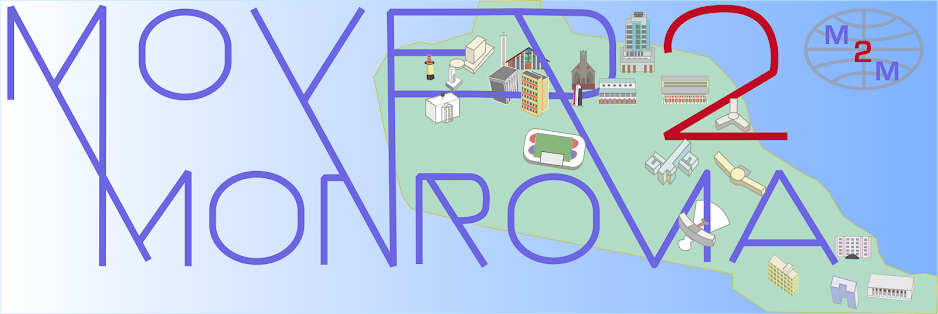
Suffering Sinkor under a Saharan Sky.
The New Year in Monrovia is usually one of this city's most pleasant periods: for about four to six weeks, from early January to mid-February, the pepper coast experiences "the mid-Dries," when the humidity drops, the breeze picks up, and the air is neither thick with moisture nor bludgeoning with the blasting force of the sun.
This period coincides with the appearance of the
Harmattan, a high-level weather pattern that brings Saharan sand south to the coast, from Nigeria to Cape Verde, and often cloaks coastal cities from Accra to Conkary in a low-visibility haze.
North America hardly has any named winds, so part of the romance of many ex-patriate West Africans' experience is constantly bemoan the Harmattan (whether their pronunciation is more Manhattan or closer to Benneton is apparently a matter of choice), even when it is bringing welcome relief from the scorching sun of the dry season rather than the noxious choke which cause such fear for the northern Sahara's sandy onslaughts of similar appellation.
The Harmattan Horizon: the ocean's edge disappears.
I am no meteorologist, so I'm in no position to describe these phenomena nor link them together, but while this year's mid-dry period has been welcomely temperate, the dust storms have been remarkably overbearing.
Learn 2 Speak Liberian:
Fog, Haze, Dust Storm = "Dew"
Liberians seem to limit their naming and observing of this phenomenon to their typically tangential word-usage: repurposing the word "dew" to apply to a high-altitude dust storm, which may in fact contain moisture but is more substantially sand than water. It is true that the low-level cover does look foggy: one morning this month the Executive Mansion was hidden behind a shiny ground cloud, unseeable from the street.
Locals also don't respond kindly to the drop in temperature: winter coats, caps and hoods are donned; when in other seasons it is mercilessly stuffy inside their ventless homes and bedrooms, Monrovians complain of suffering from "colds" and other illnesses, shivering as the weather approximates an Arizona evening for a few days.
Congo Town cloaked in haze.
This year, the dust storms have been the talk of the town, Roberts International Airport was completely shut down (flights in Ghana and elsewhere were also cancelled). Reportedly, some Delta flights nearly reached Liberian airspace before turning around to return to Accra. While the outside air temperature never dropped below 70F,
The New Dawn newspaper screeched of
"thick dew and severe cold" causing chaos at the country's principal international gateway (emphasis added):
A rather abrupt change in the weather condition here in the last few days characterized by thick dew and severe cold is said to be impeding smooth landing of commercial aircrafts at the country's main airport - the Roberts International Airport or RIA in Margibi County, leading to the daily loss of revenue.
Most airlines were unable to land here on Wednesday due to dew falling, which has obstructed visibility.
Sources at the RIA on condition of anonymity hinted the New Dawn Liberia that due to the natural causes (dew falling); aircrafts did not land at the airport on Wednesday, but at least one was expected to have landed Thursday night, February 9th.
Notwithstanding, it is yet to be confirmed by relevant authorities claims that a special flight landed at the RIA yesterday, while another flight was expected last night.
Efforts to contact the financial and technical sections at the airport to ascertain the level of financial losses being sustained as a result of the bad weather have not materialized.
Prior to the escalation of global climate change, which no doubt is affecting Liberia today, dew usually fell in January during morning hours characterized by dried air.
Liberia had dense forests, but experts have warned persistently that shifting cultivation and deforestation (by farmers and loggers) could endanger the country's rich forests. Local farmers here usually do not replace trees by replanting, thus leaving the country vulnerable to climatic challenges.
Meanwhile, in town, trees, cars and buildings were coated in a fine dust; the mid-dries made the mid-rises of Central Monrovia became mere outlines in the haze. The normally-overpowering sun became only a single low-watt bulb covered in cobwebs. While this might describe a stifling, suffering experience, the air stirred with a small breeze and the thermometers dropped enough to give the air-conditioners a much-needed break, and window-screens checked to be left open in the evenings.




No comments:
Post a Comment